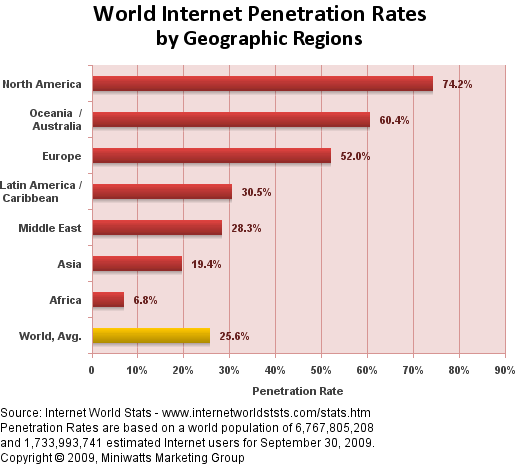One hundred years ago, there were few telephones, and only telephone connection within cities and between some large cities; the first transatlantic calls were still in the future. The first voice radio transmission had been made a couple of years earlier. While the first vacuum tube electronic devices had been invented, there were no transistors much less integrated circuits. There was no television. There were no computers.
Today,
according to the ITU, there are a billion and a quarter land line telephones and well over four billion cell phones in operation. Radio and television are ubiquitous, even in developing nations.
It is estimated that the number of personal computers in the world reached one billion in 2008 and will reach two billion in 2014.
It is estimated that 1.6 billion people use the Internet.
While the personal computer and Internet connection are familiar to all the readers of this blog, it may be less obvious that information technology pervades our lives in other ways, from capital intensive instalations such as the data centers that were estimated to utilize half of one percent of the world's electricity in 2005 and the the supercomputers used in industry and research laboratories, to the inexpensive devices that one finds in appliances from wrist watches and home appliances to automobiles.
I suggest that we are no more likely to be able to predict the extent of the information and communications infrastructure one hundred years from now than were our ancestors to predict the extent today. I will predict that a century from now, today will be seen as the midpoint in the Information Revolution, and that the decisions made by society today will be seen as critical to the development of the Information Revolution over the next century.
Implications for UNESCO
The Information Revolution is already revolutionizing education, science, and culture -- sometimes in ways that we find most uncomfortable. As a result, new demands are being made on UNESCO to take on new programmatic challenges, and given the limitation of resources, to abandon some old priorities.
I want to direct this posting to the Communications and Information Program. That Program has leadership within the United Nations system in several key aspects of the Information Revolution.
- While the ITU has leadership in telecommunications, UNESCO seems the appropriate agency to lead in information technology, including computers and software. Most of the billion personal computers in the world are in rich countries, while most people are in poor countries. UNESCO should lead in the intellectual exploration of how to bridge this digital divide.
- While the world is awash with digital content, there is a dearth of content relevant to the needs of huge numbers of people in developing nations. Those people need content in languages they understand, relevant to the problems they face and resources they possess, available in forms they will use, delivered via media they will use. UNESCO should lead as the world figures out how better to deliver content to the poor majority of its inhabitants.
- Information increasingly resides in cyberspace, but cyberspace is so new that the global community has not yet institutionalized the systems to organize cyberspace appropriately. UNESCO should lead the global intellectual effort to figure out how best to create the institutions needed for the global society to best utilize cyberspace for the storage, organization and dissemination of information.
- UNESCO has since its founding been a bastion for the protection of freedom of expression and freedom of the press, as well as a bulwark against the propaganda of coercive governments, and these functions are perhaps increasingly important due to the Information Revolution.
The new Director General, to be chosen by the Executive Board next month and ratified by the General Conference in October, should have a strong intellectual understanding of the importance of these issues, the charisma to lead UNESCO to make rapid progress in facing them, and the humility to recognize that a very strong team within UNESCO and network outside UNESCO should be created to deal with them. He/she should be able to develop a resource base to allow UNESCO to act much more effectively than it can now on these issues
John Daly
(The opinions expressed above are those of the author, and do not necessarily represent those of Americans for UNESCO.)













 Sargeant, a Rhodes Scholar, was a career diplomat who became Assistant Secretary of State for Public Affairs before leaving government to run Radio Liberation, which broadcast to the Soviet Union.
Sargeant, a Rhodes Scholar, was a career diplomat who became Assistant Secretary of State for Public Affairs before leaving government to run Radio Liberation, which broadcast to the Soviet Union.